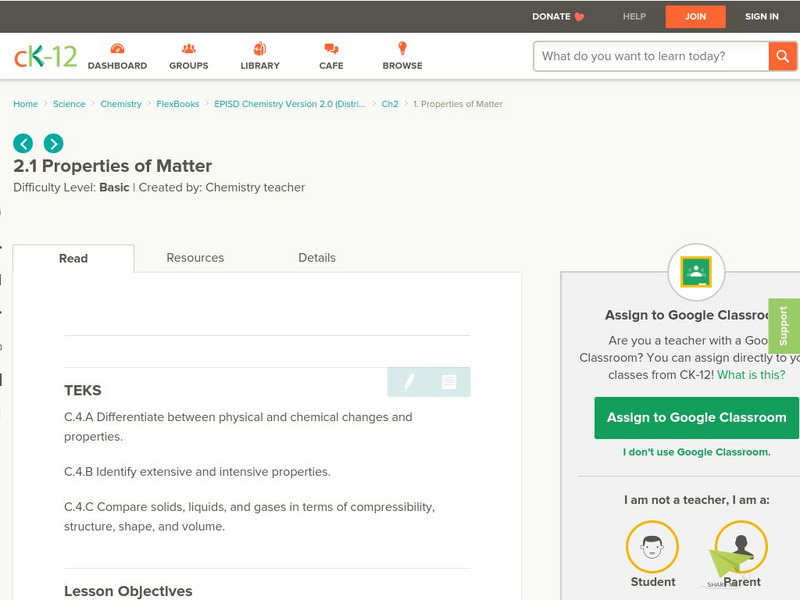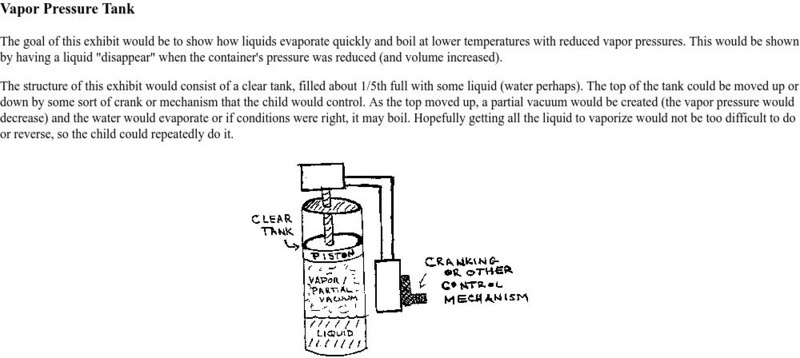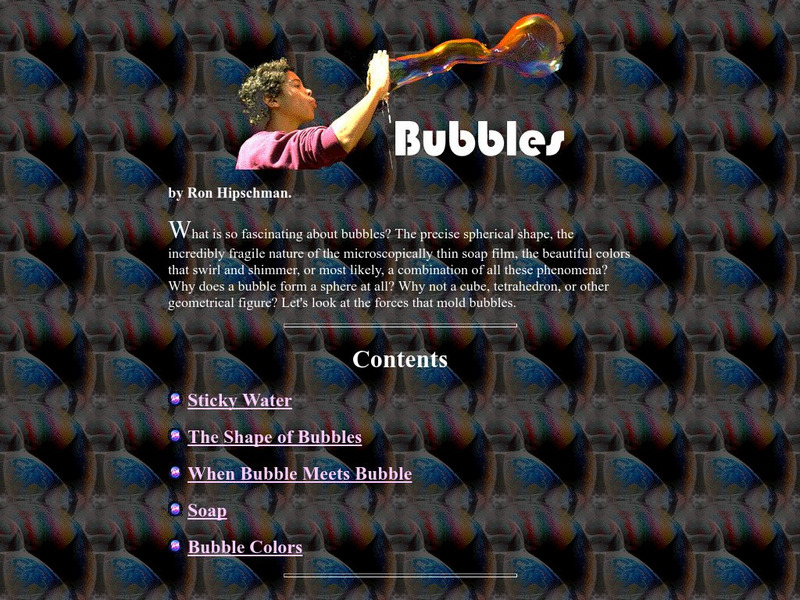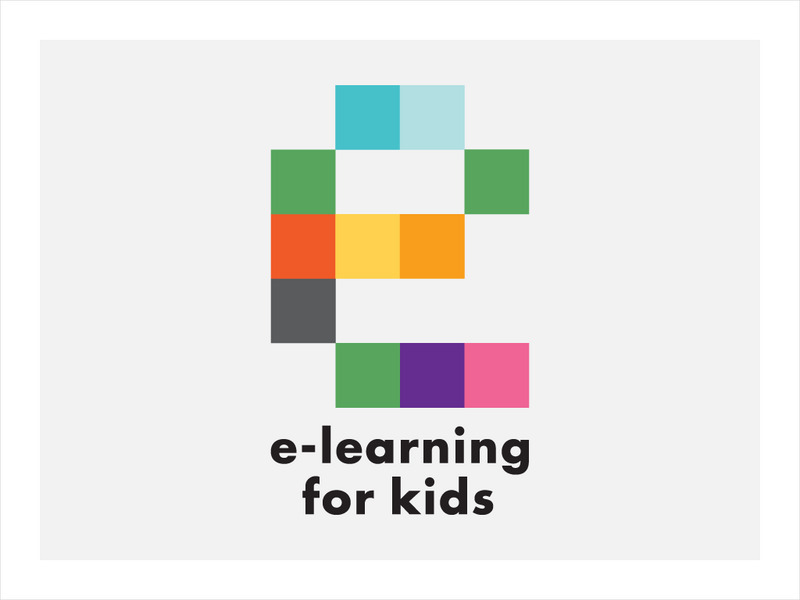CK-12 Foundation
Ck 12: Liquids
[Free Registration/Login may be required to access all resource tools.] In the following online tutorial students will describe a liquid according to the kinetic-molecular theory. They will also learn how a liquid exhibits surface...
Georgia Department of Education
Ga Virtual Learning: Fluids
In this interactive module you will be introduced to a unit on fluid dynamics. Learn how an object's density relates to its mass and volume by completing various activities and interactives.
American Chemical Society
American Chemical Society: Science for Kids: Solids, Liquids and Gases
Engaging hands on science lessons for grades 2-6 on the three states of matter.
TeachEngineering
Teach Engineering: Viscous Fluids
Students are introduced to the similarities and differences in the behaviors of elastic solids and viscous fluids. Several types of fluid behaviors are described--Bingham plastic, Newtonian, shear thinning and shear thickening--along...
CK-12 Foundation
Ck 12: Properties of Matter
[Free Registration/Login may be required to access all resource tools.] In this online tutorial, students will begin to understand a substance according to its physical properties. Learn to distinguish between extensive and intensive...
Chem4kids
Chem4 Kids: Liquids
This overview of liquids explores what a liquid is and how matter becomes changes into a liquid.
eSchool Today
E School Today: What Is Matter
Learn about matter, its three states, changes of state, how matter behaves, and physical and chemical changes in matter.
Other
Ancient scripts.com: Phonetics
Ancient Scripts features a tutorial on phonetics and the terminology used to describe the sounds and the tones that make up spoken language.
Concord Consortium
Concord Consortium: Molecular View of a Liquid
This simulation allows students to make observations about the structure and movement of particles in a liquid.
American Chemical Society
Middle School Chemistry: Heating and Cooling a Liquid
This simulation allows students to make observations about how particle motion changes as the overall temperature of a liquid changes.
Utah Education Network
Uen: Liquid Exploration
Observe the differences between solids, liquids and gases.
American Chemical Society
Inquiry in Action: Using the Combining Test to Identify the Unknown Liquids
Learn how you can identify unknown liquids by knowing the characteristic way each liquid combines with water in this activity. Lab experiment includes teacher and student instructions.
University of Florida
Florida Museum of Natural History: Investigating Water
This guide engages children in the process of scientific inquiry using the context of a favorite early childhood pastime-water play.
Children's Museum
The Children's Museum of Indianapolis: Exploding Baggies
Young scholars will witness a fascinating chemical reaction and learn how to identify when a reaction has occurred by combining simple ingredients.
Children's Museum
The Children's Museum of Indianapolis: Color Changing Milk
Young scholars observe a molecular dance of bursting colors through exploring states of matter and learning that materials can be characterize by how they respond to water.
Children's Museum
The Children's Museum of Indianapolis: Tie Dye Paper
Learners characterize materials by their state of matter and then combined materials to create a piece of colorful, tie dye-esque paper.
Carnegie Mellon University
Carnegie Mellon: Vapor Pressure Tank
Basic design of a demonstration machine that will lower the vapor pressure and cause water to evaporate at room temperature.
Chiral Publishing
Chiral Publishing: An Introduction to Chemistry: Liquids: Condensation, Evaporation and Dynamic Equilibrium: Study [Pdf]
This study guide reviews the main ideas in the liquids chapter in this online textbook. Includes a chapter map, goals, a checklist, and answers to the chapter review.
Chiral Publishing
Chiral Publishing: An Introduction to Chemistry: Liquids: Condensation, Evaporation, and Dynamic Equilibrium
This presentation, available in .pdf format, about liquids includes a chapter map, main ideas, and many pictures to help understand the chapter. Detailed charts go along well with the information.
Exploratorium
Exploratorium: Soap Bubbles
A scientific look at soap bubbles. Find out what it is about soap and water that allows bubbles to occur, how bubbles stick to each other, and why they are always a sphere. There are even formulae for making your own bubble solution.
E-learning for Kids
E Learning for Kids: Science: Bermuda Triangle: What Happens When an Object Gains or Loses Heat?
Learn about states of matter on a flight tour over the Atlantic Ocean.
Science Education Resource Center at Carleton College
Serc: Polymers & Plastics: Classification & Models
Students will use their prior knowledge about changes of matter including physical and chemical changes to examine and categorize various types of plastics (polymers). They will identify how their chemical properties allow them to have...
Science Education Resource Center at Carleton College
Serc: Measuring Liquid Volume
In this lab, students will measure and combine colored liquids to receive the expected results. The intended outcome would be to take primary colored liquids, measure them and combine them to create a "rainbow" colored set of water in...
Science Education Resource Center at Carleton College
Serc: Investigating Liquids: Color Changing Milk
In this chemistry lab, the students will investigate what happens to the liquids: milk and food coloring, when dish soap is placed on a Q-tip and then put into the solution.
















